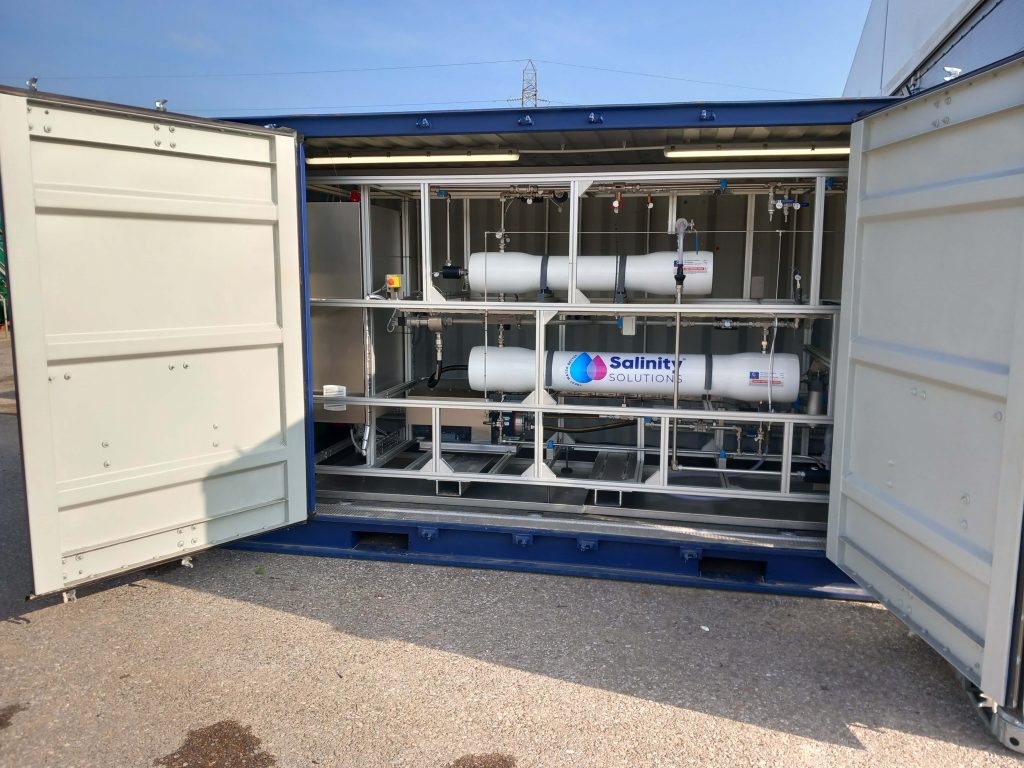Ben Hazard, Process Engineer at Te-Tech Process Solutions, discusses how highly efficient hybrid batch reverse osmosis (RO) can cut water and energy consumption across a number of municipal and industrial water treatment applications.

For more than half a century, reverse osmosis has been recognised as the ultimate water treatment process. The latest generation of membranes reject not only dissolved ions but also many organic species including many pesticides, pharmaceuticals, and heavy metals. Although the process is used worldwide, it is often selected in only specific applications due to its traditionally high operating costs.
But that is about to change. A fully automatic hybrid batch RO system with a patented pressure exchange system not only reduces energy consumption but also allows a much higher water recovery. And the potential applications are endless.
Cutting excessive industrial water consumption
Industries such as agriculture, manufacturing, energy production, and mining are among the largest consumers of water. Reducing industrial water consumption through wastewater reuse and recycling is crucial to reducing water stress and ensure availability for future generations.
Initial trials for lithium extraction demonstrated the technology could concentrate lithium solutions by a factor of 5, about double that achievable using conventional RO systems, and with lower energy and water consumption.
Agriculture alone accounts for about 70% of global freshwater use, primarily for irrigation. Investment in vertical farming could help reduce the vast amount of water required to put food on our plates.
A recent pilot trial undertaken at a food manufacturer in Kent allowed wastewater from the growing process as well as from cleaning processes, to be collected, treated, and then reused. The site spans just five acres but has the equivalent of 1,000 acres of growing space in a controlled environment. The pilot plant achieved the same quality as conventional RO but at roughly 50% of the energy cost; a major advantage in this cost-sensitive industry.
Protecting water systems
In the municipal water industry, tight phosphorus discharges from sewage treatment works, together with increasing concerns about emerging pollutants prompted a water company in South West England to trial the technology at one of their wastewater treatment works.
The pilot plant showed over 98% of total phosphorus and 88% of total nitrogen removed from the final effluent, with an average energy consumption around 1.2 kWh/m3 compared with significantly higher energy consumption for conventional RO at the same scale. The volume of waste brine produced was 8% of the feed compared with about 30% for conventional RO systems.
Tackling ‘forever chemicals’
Reverse osmosis can remove per- and polyfluoroalkyl substances (PFAS), aka ‘forever chemicals’, alongside other pharmaceuticals, heavy metals, and contaminants. Considering current wastewater treatment processes are not designed to remove PFAS, they escape into water systems, and are causing a growing concern. PFAS in the environment poses serious health risks include cancer, fertility issues, and defects in unborn children.
Desalination potential
In one recent customer field trial for a brackish water application, the hybrid batch RO system achieved a 95% recovery rate and a concentrated brine with a 20x concentration factor all with a specific energy consumption of only 0.5 kWh/m3.
Patented and Proven Technology
Without doubt, the water industry will increasingly turn to RO whether it be for tertiary municipal sewage treatment, removal of trace contaminants from drinking water, or recycling of wastewater to reduce industrial water consumption.
RO is proven technology and has been used in critical industrial applications for decades. The development of the hybrid batch system has opened the door to cost-effective and sustainable RO, which will provide a huge opportunity for improved sustainability for water treatment applications.
The new SAM50, patented by Salinity Solutions, had their first Hybrid Batch RO (HyBatchTM) patent granted in the US, joining the EU and China which were granted in December last year, and were awarded Manufacturing StartUp of the Year in the StartUp Awards (Midlands) and the 2023 Water Industry Award for Energy in Water.
Te-Tech Process Solutions is supporting Salinity Solutions as manufacturing partner for the SAM50 RO systems.
The main article can be found in Water Magazine.
About the author

Ben Hazard, Process Engineer
Ben is an experienced process engineer with a Masters degree in Chemical Engineering from Loughborough University. He started his career as an engineering graduate for Affinity Water and has since delivered process solutions on a range of water and wastewater treatment schemes. More recently, he has developed the water and wastewater treatment product portfolio. Ben will continue to develop the innovative treatment processes and provide process engineering expertise to our clients.